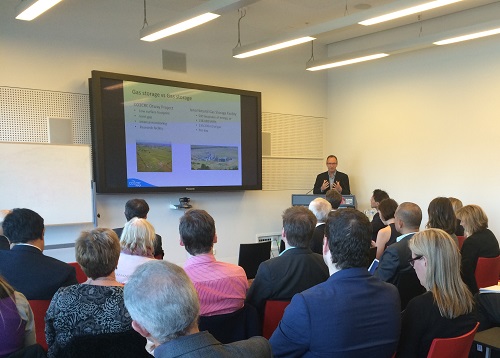Insights and Commentaries
Asia-Pacific CCUS Legal and Regulatory Forum
15th June 2015
Topic(s): Carbon capture, law and regulation, Policy, use and storage (CCUS)
In this Insight the Institute's Ian Havercroft, Senior Adviser - Legal and Regulatory in the APAC region discusses a new Institute initiative - the Asia-Pacific CCUS Legal and Regulatory Forum.
In recent years the Institute has undertaken a number of in-country legal and regulatory activities across the APAC region with the principle aim of offering expert advice on the development of CCS-specific legislation or providing analysis of the global status of law and regulation.
Feedback from government, industry and academic stakeholders across the region has consistently revealed an appetite for regionally-focussed fora to discuss law and regulation. The Institute has therefore established the Asia-Pacific CCUS Legal and Regulatory Forum to address this demand and further enhance the understanding of legal and regulatory issues amongst policymakers and regulators across the APAC region.
A first meeting of the Forum was held in Melbourne on 28 May, 2015, attracting participants from across the APAC region. This first event addressed a largely Australia-centric agenda, but also considered the broader global context and the issues of monitoring and long-term liability of carbon dioxide (CO2) storage.

Dr Matthias Raab of CO2CRC presents at the Asia-Pacific CCUS Legal and Regulatory Forum. Picture: Global CCS Institute
Global perspectives on the role of law and regulation
A clear theme to emerge from the meeting was the likely influence upon the Asia Pacific region of prior international legal and regulatory development and best practice. Juho Lipponen of the International Energy Agency (IEA) highlighted in his presentation:
- the role law and regulation has played in supporting the deployment of the technology, as well as
- the considerable number of legal instruments for CO2 storage which have been adopted since 2005.
In presenting lessons from the IEA’s work in the space and lessons learned from these earlier models, Mr Lipponen highlighted in particular;
- the need for countries to focus upon national requirements in their legal and regulatory models
- that ‘one-size does not fit all’ when it comes to developing frameworks.
Ilona Millar of Baker & McKenzie provided a similar contextual account of global developments, focusing upon the technology’s incorporation within the international climate change agreements. In highlighting potential opportunities for CCS in the mitigation outcomes at the international climate talks in Paris later this year, Ms. Millar also noted that a number of uncertainties remain.
The availability of finance, the scale of future emissions reductions targets and States’ willingness to advocate for the technology, would all be critical to for CCS.
Development of legal frameworks
The development of legal and regulatory models and their role in supporting project deployment was a further theme considered during the meeting. A presentation from Victoria Mendes Da Costa on the CarbonNet project’s experiences emphasised the successes of the regime established in the State of Victoria. In particular, Ms Da Costa highlighted the Victorian government’s achievements in developing ‘fit-for-purpose’ CCS legislation, which had enabled the project to progress with the permitting of field activities and exploration rights.
A different approach to law and regulation in support of projects was raised by Colin Harvey of the Department of Mines and Petroleum in Western Australia. Mr Harvey considered the approach adopted to-date in the State and, as he proposed, the ‘pragmatic approach’ to regulation established under the State’s Barrow Island Act of 2003. Here project-specific legislation, an example of a ‘State Agreement’, has provided an effective model for regulating the storage specific activities associated with the Gorgon gas project.
Despite these positive messages however, there remain a number of challenges associated with legal frameworks across the region. The need to develop legislation remains an important priority for many jurisdictions in the region, and is particularly urgent for those countries with policy commitments to the technology and projects in the pipeline. Professor Gao Lin of the Institute of Engineering Thermophysics emphasised in his presentation the urgent need to deploy a complete regulatory framework to support project deployment in China.
For those jurisdictions which have already commenced this process and have regulatory models in place, cautionary notes were raised by some workshop participants with regard to the administrative elements associated with the legislative process. The time taken to develop legislation, streamline processes and remedy remaining challenges in some of the regulatory models were all highlighted as issues to be addressed by regulators and policymakers alike.
The technical reality of legal and regulatory obligations
Technical presentations from Dr Charles Jenkins of CSIRO and Dr Matthias Raab of the CO2CRC, raised some important issues with regard to the relationship between regulators and project proponents.
Dr Jenkins’ presentation on monitoring data and regulation highlighted several areas where interactions would likely occur during the operation of a project and where the requirements imposed upon project operators by law and regulation would require careful interpretation. Clear from these examples is the need for flexibility and close dialogue between all parties involved to ensure clarity in both technical feasibility and regulatory requirements. Examples provided by Dr Raab in his presentation with regard to the regulatory requirements associated with the monitoring of a CO2 plume provided further tangible and project-specific examples of the need for consistent dialogue and flexibility between an operator and regulator.
The presentations and subsequent discussions raised a number of important issues and considerations, which have perhaps yet to be fully considered by regulators and project proponents. A deeper understanding of the issues raised however, will likely become increasingly important as further large-scale CCS projects move into the operational phase.
Further meetings
The Institute intends to hold further meetings of the Forum, across the APAC region, in the forthcoming year. If you would like further information on these meetings, or to discuss the Institute’s legal and regulatory work in the region, please contact Mr. Ian Havercroft, Senior Adviser – Legal and Regulatory (Ian.Havercroft@globalccsinstitute.com).